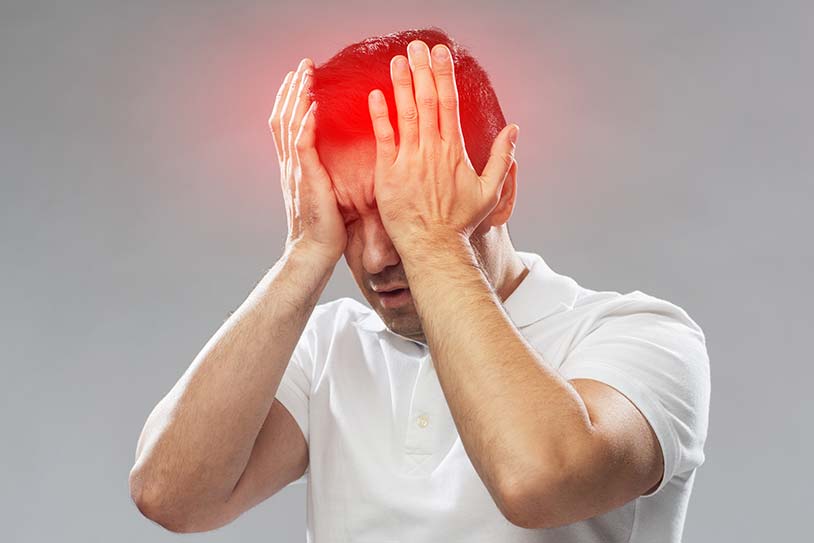
Chronic headaches and migraines are common ailments that many people experience. If you have a chronic headache, navigating your day to life can be very difficult and uncomfortable. The search for relief from the invincible pains caused by this condition will make you feel overwhelmed and unfocused. While recovering from chronic headaches and migraines might seem out of sight, there are several ways you can tackle this condition. Here are six ways you can help reduce the effects of chronic headaches and migraines.
1. Manage Stress
Research has linked chronic headaches and migraines to both cognitive and emotional factors. If you are stressed or have negative feelings, you are likely to have migraines. You need to learn how to cope with stress and have an outlet for your feelings. This will go a long way in reducing the intensity of chronic headaches and migraines. You will also recover from them quicker. If you are stressed about anything, you should seek professional help. Discuss with a counselor and let them know what triggers your headaches. You could be stressed due to financial problems or the loss of a loved one; either way, seeking help will facilitate a healthier and stress-free mind.
2. Regular Exercise
Exercising regularly will significantly reduce the intensity and frequency of migraines. By exercising, you expose your body to vigorous activities, prompting the release of stress-reducing hormones. An ideal exercising program should include a 30-minute session daily. Some of the most reliable ways you can exercise include;
- Jogging
- Weight lifting
- Running
- Push-Ups
- Skipping rope
If you like any sport, you can also play it. For instance, spending 30 minutes a day playing football or basketball will help improve your mental health. This will also reduce the impact of chronic headaches and migraines. However, you need to be careful not to worsen the condition by pushing your body beyond the limit. If the headache gets intense while exercising, take a break and let it cool down. Being cautious while exercising will also help. For instance, you shouldn’t head a soccer ball while playing because it can trigger headaches. The goal is maintaining regular exercises, not pushing your body beyond its limit.
3. Sleep Well
Sleep is vital for a healthy body. Getting a good night’s sleep helps prevent migraines. However, while sleeping well helps reduce chronic headaches, too much sleep can be harmful. Experts advise that you need to sleep for around eight hours for the best results. You should also maintain your sleeping schedule; go to bed around the same time every day
While most people fall asleep easily, some have difficulties sleeping or remaining asleep. In that case, you should discuss with your physician for possible solutions. One way of dealing with insomnia is establishing a bed routine. For instance, you can read a novel or watch a movie.
Therefore, it is important to sleep on time, especially if you have to wake up early. Insufficient sleep will not only affect your mental health but also trigger chronic headaches and migraines.
4. Avoid Bad Habits
There are several habits that can trigger migraines. For example, smoking is a well-known trigger of headaches. If you are in the habit of smoking regularly, you should find a way to stop it. Excessive intake of caffeine is also a known trigger of migraines. One of the sources of caffeine is alcoholic drinks. If you drink a lot of alcohol, you are likely to wake up with a severe headache. Therefore, you should also stop the heavy consumption of alcohol. If you are suffering from alcohol addiction, seek treatment as soon as possible. This will help reduce the frequency of migraines and chronic headaches.
Being around bright lights, strong scents, and loud noises can also trigger chronic migraines. Luckily, you can easily avoid any of these situations. For instance, if you are at a place with bright lights, you can switch them off or wear sunglasses with polarized lenses. Doing so will prevent your exposure to bright lights. You should also avoid loud noises at all costs. If you have to go to places with loud noises, you can wear noise-canceling headphones. By doing so, you reduce the risk of triggering migraines.

5. Build a Support System
Some of the leading causes of frustration when dealing with chronic headaches include being misunderstood, the feeling of being alone, and having insufficient resources. Having a reliable support system will provide you with the validation and motivation to manage the condition. Besides family and friends, you can benefit immensely from social groups. Joining groups of other people suffering from chronic headaches and migraines will give you the strength and courage to withstand the discomfort. These groups provide you with empathy, validation, and the motivation you need. Therefore, you should build a reliable support system that will stand by you while you tackle chronic headaches and migraines.
6. Eat Well
A proper diet is vital for a healthy body. By eating well, you equip your body with the essential nutrients needed to tackle headaches and migraines. Some of the foods you should eat to tackle migraines are those rich in magnesium. Some of the foods rich in magnesium include avocado, leafy greens, and tuna. Besides, you should eat foods rich in Omega-3 fatty acids. These foods contain elements that help reduce chronic headaches. Some of the foods rich in Omega-3 fatty acids include seeds, legumes, kales, and fish.
While there are foods that help tackle migraines, there are some that can trigger chronic headaches. For example, foods like chocolate can trigger migraines due to the chemical beta-phenylalanine. Nitrate-rich foods like hot dogs and cured meats can also increase the risk of chronic headaches. Therefore, apart from sticking to a healthy diet and eating foods that help fight migraines, you should avoid those that trigger this condition.
Adopt a Healthy Lifestyle To Tackle Chronic Headaches and Migraines
As much as dealing with headaches and migraines can be exhausting and frustrating, you can reduce its effect and intensity by adopting a healthy lifestyle. Now that you know some of the ways you can do so, apply them for improved health. You should also see a professional in the subject of migraines and chronic headaches for better management.
“As much as dealing with headaches and migraines can be exhausting and frustrating, you can reduce its effect and intensity by adopting a healthy lifestyle.
Stenzel Clinical Services
Recent Posts
Reclaiming the Savanna Brain
In the modern world, we are surrounded by an abundance of food, safety, and information. Yet, paradoxically, we are [...]
Navigating Digital Distractions
You settle in to tackle the work you've been putting off, but interruptions are guaranteed. First, the inevitable: your [...]
Common Therapy Myths That Keep People From Getting Help
There are a lot of stories people tell themselves about therapy that stop them from reaching out. Some of [...]



